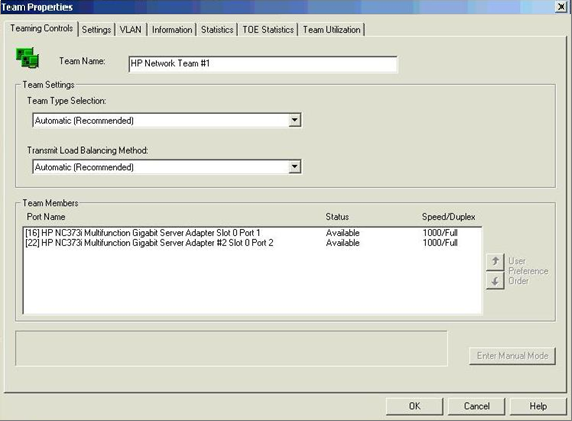Team Type
Selection. Select or change the team type of the ports to
increase throughput and fault tolerance.
Failover. During
normal operations if the Primary adapter fails, the link to the
Secondary adapter automatically takes over.
Failback. If the
Secondary adapter has a slower speed than the Primary adapter and
the Primary adapter's link is re-established after a failover event
occurs, network traffic reverts back to the Primary adapter.
If a failover event occurs for a team type
that supports a Preference Order for the teamed adapters, network
traffic will failback to the original preference order regardless
of adapter speed if the failed adapter link is re-established.
- Automatic
(Recommended). Default setting. The system automatically
selects the best team type or combination of team features based on
the configuration of the adapters in the team. 802.3ad will be used
to place team members into port trunks/channels, if possible. All
transmit packets are load balanced among all team members based on
a Load Balancing algorithm in the teaming device driver. The
receive packets are load balanced among all team members by the
switch. If a failure of any team member occurs, the packets are
load balanced among the remaining adapters. If a team contains an
iSCSI-enabled adapter, you cannot use the Automatic setting.
- 802.3ad
Dynamic with Fault Tolerance. All team members are
dynamically placed into a port-trunk/channel by dynamic protocol
agreement (LACP) with the switch. A failure of a team member to
synchronize joining a port-trunk or channel with the switch is
treated as an error and that team member is considered failed. All
transmit packets are load balanced among all team members based on
a Load Balancing algorithm in the teaming device driver. The
receive packets are load balanced among all team members by the
switch. If a failure of any team member occurs, the packets are
load balanced among the remaining adapters. If a team contains an
iSCSI-enabled adapter, you cannot use the 802.3ad Dynamic with
Fault Tolerance setting.
- Switch-assisted Load Balancing with Fault Tolerance
(SLB). All transmit packets are load balanced among all
team members based on a Load Balancing algorithm in the teaming
device driver. The receive packets are load balanced among all team
members by the switch. If a failure of any team member occurs, the
packets are load balanced among the remaining adapters. There is no
Primary adapter in a Switch-assisted Load Balancing team.
- Transmit Load
Balancing with Fault Tolerance (TLB). All transmit IP
packets are load balanced among all team members based on a Load
Balancing algorithm in the teaming device driver. The Current
Primary adapter transmits all non-IP packets, and receives all
frames for the team. If a failover event occurs, one of the
non-Primary adapters assumes the role of Current Primary adapter,
and transmit IP packets are load balanced among all remaining team
members. If a failure occurs in any of the non-Primary adapters,
the packets are load balanced among all remaining team
members.
- Transmit Load
Balancing with Fault Tolerance and Preference Order. All
transmitted IP packets are load balanced among all team members
based on a Load Balancing algorithm in the teaming device driver.
The Current Primary adapter transmits all non-IP packets, and
receives all frames for the team. If a failover event occurs, one
of the non-Primary adapters assumes the role of Current Primary
adapter, and transmitted IP packets are load balanced among all
remaining team members. If a failure occurs in any of the
non-Primary adapters, the packets are load balanced among all
remaining team members. The user sets the priority of the adapters
relative to each other within the team. The priority of the
adapters is an additional consideration when determining the
Primary adapter.
- Network Fault
Tolerance Only (NFT). NFT provides the safety of an
additional backup link between the server and hub/switch. NFT is
implemented with a Primary adapter and a Secondary (backup)
adapter(s). During normal operations, if the Primary adapter fails,
the link to the Secondary adapter automatically takes over.
- Network Fault
Tolerance only (NFT) with Preference Order. NFT provides
the safety of an additional backup link between the server and
hub/switch. NFT is implemented with a Primary adapter and a
Secondary (backup) adapter(s). During normal operations, if the
Primary adapter fails, the link to the Secondary adapter
automatically takes over. The user sets the priority of the
adapters relative to each other within the team. The priority of
the adapters is an additional consideration when determining the
Primary adapter.
